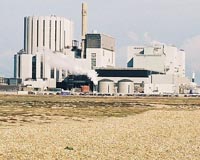 |
Moscow (AFP) April 15, 2010 Russia on Thursday shut down its last weapons-grade plutonium reactor, in line with a pledge made at a nuclear security summit in Washington this week, officials said. "It was shut down today at 0400 GMT," Yelena Golovinkina, a spokeswoman for the Mining-Chemical Complex in the Siberian city of Zheleznogorsk, which houses the reactor, told AFP. Russian President Dmitry Medvedev had pledged to close the reactor earlier this week at the 47-nation summit hosted by US President Barack Obama dedicated to keeping nuclear arms away from extremists. "I welcome this significant announcement from President Medvedev. This important step forward continues to demonstrate Russia's leadership on nuclear security issues, and will add momentum to our shared global effort," Obama said Tuesday. "The closure of the ADE-2 reactor has major international significance. It is the last active military plutonium producer in the world," a statement on the website of Mining-Chemical Complex said Wednesday. The ADE-2 reactor opened in 1964 in Zheleznogorsk, then a secret city known as Krasnoyarsk-26 that had been built as a military production zone. Located about 4,000 kilometres (2,500 miles) east of Moscow, the production complex was founded in 1950 on the orders of Soviet dictator Joseph Stalin. Two other reactors there were closed in 1992, Golovinkina said. In 1995, Russia's defence ministry stopped using the plutonium for military needs and the plant was used mainly to heat the city of Zheleznogorsk, she said. Plutonium produced at the plant since 1995 is currently in a storage centre in the Siberian city of Chelyabinsk, a spokesman for Russia's state-owned nuclear energy company Rosatom told AFP. The closure of the reactor came one week after Obama and Medvedev signed a nuclear disarmament treaty touted by both sides as a major step towards improving strained US-Russian relations. Obama has made nuclear non-proliferation a signature issue of his foreign policy, which was on display at this week's nuclear security summit. During the summit, Russia and the United States signed a protocol pledging to dispose of 34 tons of excess weapons-grade plutonium each, enough to make 17,000 weapons. The cost of disposing of the Russian plutonium will be 2.5 billion dollars, Russian Foreign Minister Sergei Lavrov estimated. The head of Rosatom, Sergei Kiriyenko, said Thursday that the cost could reach three billion dollars, the RIA-Novosti news agency reported. Both officials said the United States would provide 400 million dollars to finance the disposal project.
Share This Article With Planet Earth
Related Links Nuclear Power News - Nuclear Science, Nuclear Technology Powering The World in the 21st Century at Energy-Daily.com
 Security breaches at world's nuclear sites
Security breaches at world's nuclear sitesWashington (AFP) April 13, 2010 From gunmen storming a nuclear site in South Africa to Russian workers scheming to sell uranium, security breaches in recent years have raised fears about the safety of the world's nuclear material. With securing weapons-grade uranium and plutonium the focus of a 47-nation summit underway in Washington, here is a brief summary of incidents over the past two decades in which nuclear materials ... read more |
|
| The content herein, unless otherwise known to be public domain, are Copyright 1995-2010 - SpaceDaily. AFP and UPI Wire Stories are copyright Agence France-Presse and United Press International. ESA Portal Reports are copyright European Space Agency. All NASA sourced material is public domain. Additional copyrights may apply in whole or part to other bona fide parties. Advertising does not imply endorsement,agreement or approval of any opinions, statements or information provided by SpaceDaily on any Web page published or hosted by SpaceDaily. Privacy Statement |